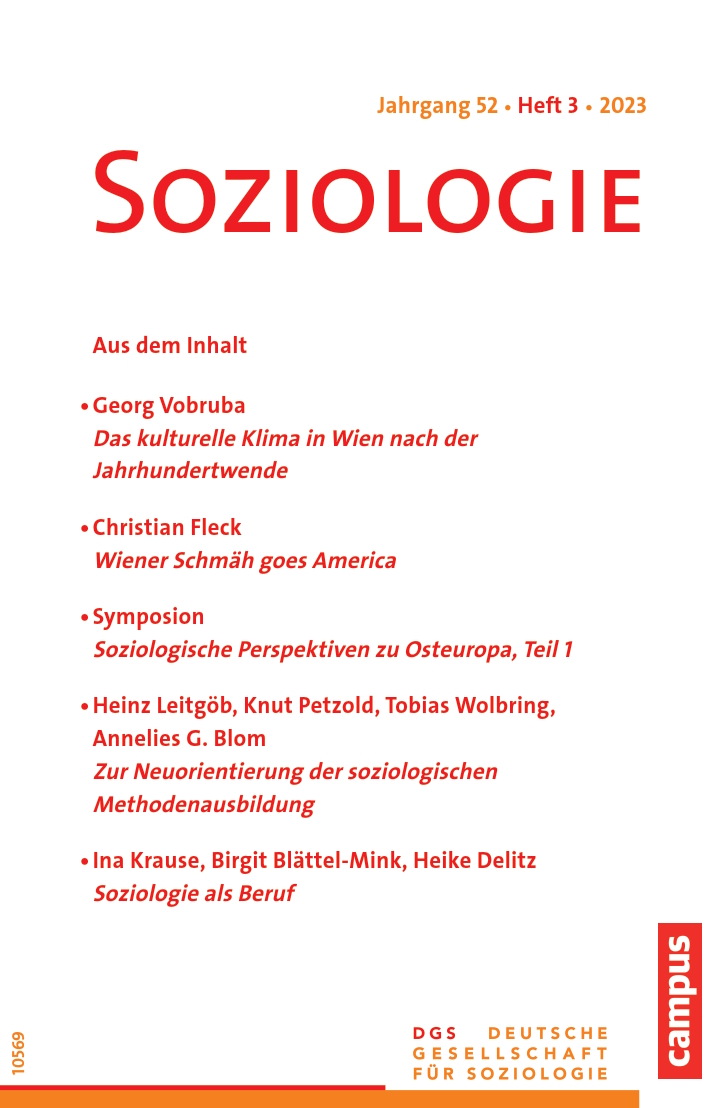Zur Neuorientierung der soziologischen Methodenausbildung
Weiterführende Überlegungen
Schlagwörter:
Reform der Methodenausbildung, Methodenausbildung, Methoden, LehrinhalteAbstract
In Heft 1/2023 der Soziologie spricht sich Andreas Diekmann für eine grundlegende Reform der soziologischen Methodenausbildung aus. Wir greifen die angestoßene Debatte auf und ergänzen die von Andreas Diekmann adressierten Themenbereiche zur Erweiterung der Lehrinhalte insbesondere um Kompetenzen der Gewinnung und Anwendung »neuer Daten« sowie der algorithmischen Datenanalyse. Neben den Lehrinhalten stellen wir Überlegungen zur Adaption der allgemeinen Lehrprinzipien an und formulieren erste Denkanstöße zur praktischen Umsetzung einer solchen Neuorientierung der Methodenlehre.
In Soziologie 1/2023 Andreas Diekmann argues in favour of a reform of the sociological methods curricula at universities. Our article constitutes an extension of the debate initiated by him. We advocate for teaching new competencies in the collection of and information retrieval from »new data« as well as in algorithmic data analysis. In addition, we propose an adaptation of general teaching principles and formulate initial ideas for the practical implementation of such a reform.
Literaturhinweise
Amaya, Ashley / Biemer, Paul P. / Kinyon, David 2020: Total error in a big data world: Adapting the TSE framework to big data. Journal of Survey Statistics & Methodology, vol. 8, no. 1, 89–119. doi: 10.1093/jssam/smz056.
Breiman, Leo 2001: Statistical modeling: The two cultures. Statistical Science, vol. 16, no. 3, 199–231. doi: 10.1214/ss/1009213726.
Cornesse, Corinna et al. 2020: A review of conceptual approaches and empirical evidence on probability and nonprobability sample survey research. Journal of Survey Statistics & Methodology, vol. 8, no. 1, 4–36. doi: 10.1093/jssam/smz041.
Diekmann, Andreas 2023: Neuorientierung der Methoden-Ausbildung. SOZIO-LOGIE, 52. Jg., Heft 1, 68–71.
Edelmann, Achim / Wolff, Tom / Montagne, Danielle / Bail, Christopher C. 2020: Computational social science and sociology. Annual Review of Sociology, vol. 46, 61–81. doi: 10.1146/annurev-soc-121919-054621.
Foster, Ian / Ghani, Rayid / Jarmin, Ron S. / Kreuter, Frauke / Lane, Julia (eds.) 2021: Big data and social science. Data science methods and tools for research and practice. Boca Raton: CRC Press.
Friedrich, Sarah et al. 2022: Is there a role for statistics in artificial intelligence? Advances in Data Analysis & Classification, vol. 16, no. 4, 823–846. doi: 10.1007/s11634-021-00455-6.
Golder, Scott A. / Macy, Michael W. 2014: Digital footprints: Opportunities and challenges for online social research. Annual Review of Sociology, vol. 40, 129–152. doi: 10.1146/annurev-soc-071913-043145.
Johnson, Timothy P. / Smith, Tom W. 2017: Big data and survey research: Supplement or substitute? In Piyushimita Thakuriah / Nebiyou Tilahun / Moira Zellner (eds.), Seeing cities through big data. Cham: Springer, 113–125.
Kressin, Lisa 2022: Disziplinierung durch Methode: Zur Bedeutung der Methodenlehre für das Fach Soziologie. Bielefeld: transcript.
Lazer, David M. J. et al. 2020: Computational social science: Obstacles and op-portunities. Science, vol. 369, no. 6507, 1060–1062. doi: 10.1126/science.aaz8170.
Leitgöb, Heinz / Prandner, Dimitri / Wolbring, Tobias 2023: Big data and machine learning in sociology. Frontiers in Sociology, vol. 8. doi: 10.3389/fsoc.2023. 1173155.
Leitgöb, Heinz / Wolbring, Tobias 2021: Die Methoden der empirischen Sozial-forschung im digitalen Zeitalter. Entwicklungen, Möglichkeiten und Heraus-forderungen. In Tobias Wolbring / Heinz Leitgöb / Frank Faulbaum (Hg.), Sozialwissenschaftliche Datenerhebung im digitalen Zeitalter. Wiesbaden: Springer VS, 7–43
Otte, Gunnar / Sawert, Tim / Brüderl, Josef / Kley, Stefanie / Kroneberg, Cle-mens / Rohlfing, Ingo 2023: Gütekriterien in der Soziologie. Eine analytisch-empirische Perspektive. Zeitschrift für Soziologie, 52. Jg., Heft 1, 26–49. doi: 10.1515/zfsoz -2023-2006.
Salganik, Matthew J. 2018: Bit by bit: Social research in the digital age. Princeton: Princeton University Press.
Schnell, Rainer 2019: »Big Data« aus sozialwissenschaftlicher Sicht: Warum es kaum sozialwissenschaftliche Studien ohne Erhebungen gibt. In Daniel Baron / Oliver Arránz Becker / Daniel Lois (Hg.), Erklärende Soziologie und soziale Praxis. Wiesbaden: Springer VS, 101–125.
Sen, Indira / Flöck, Fabian / Weller, Karin / Weiß, Bernd / Wagner, Claudia 2021: A total error framework for digital traces of human behavior on online platforms. Public Opinion Quarterly, vol. 85, no. S1, 399–422. doi: 10.1093/poq/ nfab018.
Watts, Duncan J. 2014: Common sense and sociological explanations. American Journal of Sociology, vol. 120, no. 2, 313–351. doi: 10.1086/678271.
Wolbring, Tobias 2020: The digital revolution in the social sciences: Five theses about big data and other recent methodological innovations from an analytical sociologist. In Sabine Maasen / Jan-Hendrik Passoth (eds.), Sociology of the digital – Digital sociology, Soziale Welt Sonderband 23. Baden-Baden: Nomos, 60–72.


